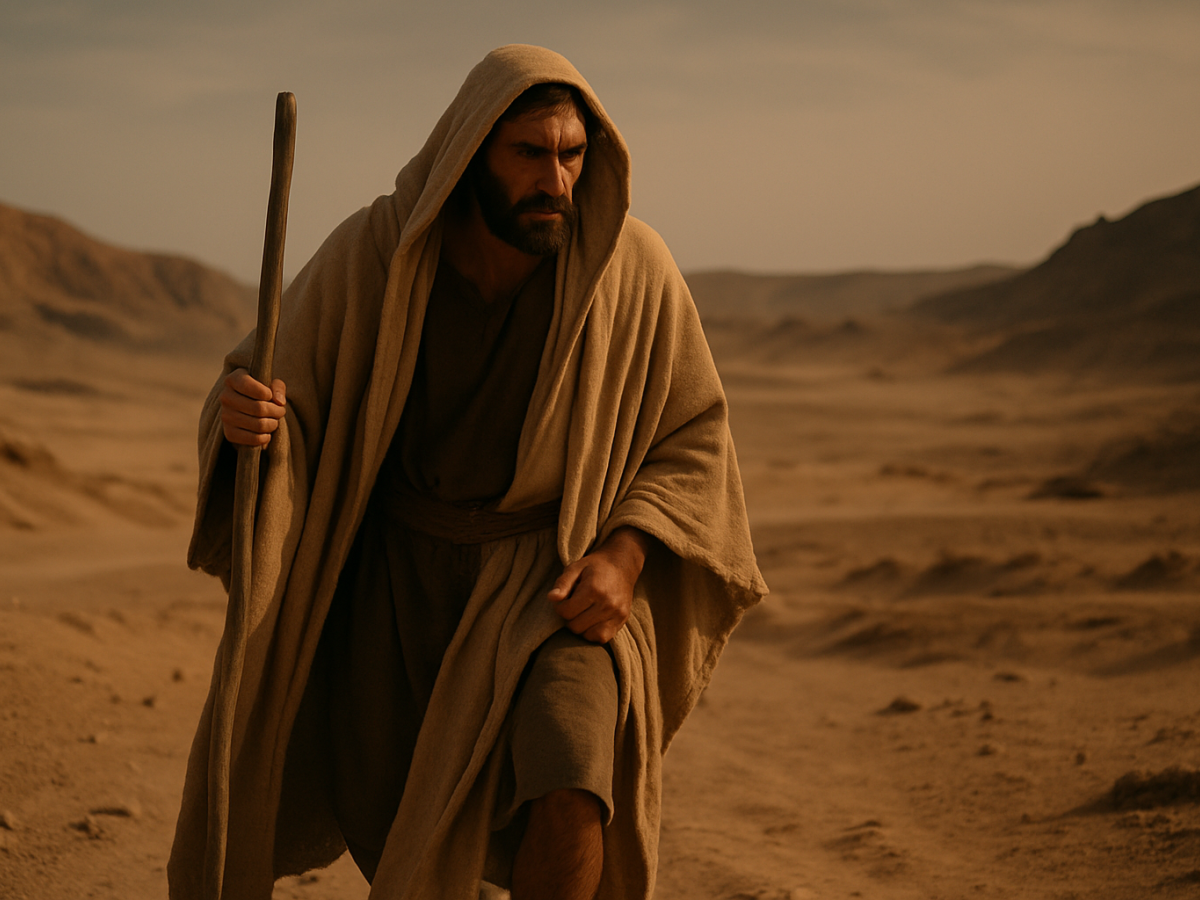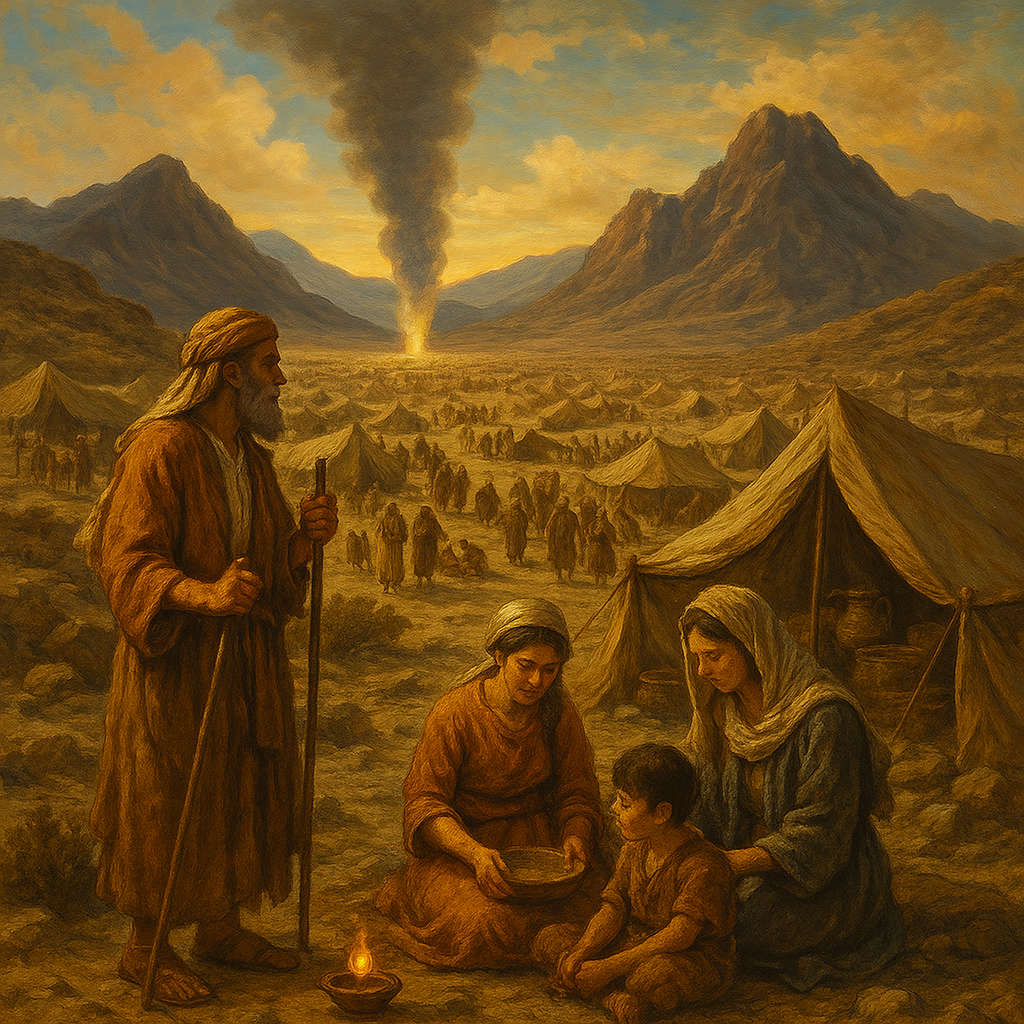
The Wilderness: Punishment or Preparation?
Is the wilderness a curse or a gift? Is it the place where covenant breakers are banished to suffer, or is it the crucible where God forms His people for life with Him? The answer, as with much in the Bible, is not either/or but both/and. The wilderness is punishment and preparation, exile and encounter, judgment and mercy. To walk through the wilderness is the stage where chaos and creation wrestle, and where God trains His people to bear His image faithfully into the land.
From the beginning, the Torah frames covenant blessing and curse in terms of creation and de-creation. To walk in covenant loyalty is to dwell in ordered abundance: fruitful fields, flowing streams, healthy families, and victory over enemies. To break covenant is to invite the undoing of creation. Barrenness invades the womb, the earth withholds her bounty, the rains dry up, and enemies devour the land.
The wilderness embodies this unraveling. It is the antithesis of Eden—a “great and terrible place” filled with fiery serpents, scorpions, famine, and thirst. Instead of a well-watered garden, there is dust. Instead of shade trees, there is blazing sun. Instead of harmony, there is threat. In covenantal terms, the wilderness is what happens when humanity rejects the Creator: chaos breaks loose, and death reigns.
For Israel, the wilderness was the visible consequence of rebellion. Their grumbling, their golden calf, their refusal to enter the land—all led to God’s decree that an entire generation would perish in the desert. The wilderness was punishment for covenant failure.
And yet, judgment is not the whole story.
The Hebrew word yasar, often translated “discipline,” runs like a thread through the Torah. The wilderness was not only a place of punishment—it was the Father’s training ground. As Moses tells the people:
“Know then in your heart that as a man disciplines his son, so the Lord your God disciplines you” (Deut. 8:5).
Discipline, biblically, is never merely retribution. It is restorative, corrective, and creative. God strips away Egypt’s influence, rewires their minds, humbles His people, and teaches them dependence on His voice. For forty years He trained Israel to live not by bread alone, but by every word that comes from His mouth.
The wilderness became a paradoxical place of provision. In the chaos, God sustained His people: manna from heaven, water from the rock, clothes that did not wear out, feet that did not swell. What looked like punishment was also preservation. God was teaching His people that life flows not from circumstances but from covenant fidelity.
The Pattern of Creation
The story of the wilderness mirrors the creation story itself. In Genesis, God speaks into the formless void and orders chaos into cosmos. In Exodus and Deuteronomy, He speaks into Israel’s chaos and orders them into a people. The refrain of Genesis—“And God said”—echoes: man lives by every word that proceeds from God’s mouth.
Covenant life is creation life. Obedience to God’s mitzvot is not bondage but participation in the creative rhythm of the universe. To obey is to align with the voice that once called light from darkness and fruit from the ground. To disobey is to tear at that fabric, plunging existence back into wilderness.
Thus, the choice is stark: remember the Giver and flourish, or forget Him and unravel. Pride and arrogance threaten to undo the blessings as surely as idolatry does. Israel is warned not to say, “My power and the strength of my hands have produced this wealth for me.” Creation thrives only when the Creator is remembered.
When covenant is restored, creation itself flourishes. The land yields grain, wine, and oil. Herds multiply. Health replaces disease. Enemies are subdued. The Genesis mandate to be fruitful, multiply, fill, and subdue is renewed. The wilderness was not wasted time—it was preparatory space, the threshing floor where slaves were transformed into a kingdom of priests.
The wilderness was the long way around, but it was the only way. God was not merely getting His people out of Egypt; He was getting Egypt out of His people.
Yeshua and the Wilderness Test
This pattern is picked up and fulfilled in Yeshua’s life. After His baptism in the Jordan—the river of covenant threshold—the Spirit drives Him into the wilderness. As Israel was tested forty years, He is tested forty days. As Israel faced serpents, hunger, and idolatry, so He faces the adversary himself.
The parallels are striking. Israel’s hunger was met with manna; Yeshua’s hunger is met with the devil’s offer to turn stones into bread. Israel tested God at Massah, demanding water; Yeshua refuses to put the Lord to the test when urged to throw Himself from the Temple heights. Israel bowed before the golden calf; Yeshua resists the lure of false worship when offered the kingdoms of the world.
Each temptation is a mirror of Israel’s failure—and Yeshua responds by quoting from the Torah, “Man shall not live by bread alone…” He clings to the very words Moses used to remind Israel of their calling. Where Israel forgot, Yeshua remembers. Where Israel grumbled, Yeshua trusts. Where Israel bowed to idols, Yeshua bows only to the Father.
Even the numbers speak. Forty years in the desert for a disobedient nation; forty days in the wilderness for the faithful Son. The testing of Israel revealed a heart of rebellion; the testing of Yeshua revealed a heart wholly aligned with the Father’s will.
And just as Israel emerged from the wilderness prepared to enter the land, so Yeshua emerged from the wilderness ready to begin His public ministry. His wilderness victory is the foundation for His healings, His teaching, His authority over storms and demons. Before He could subdue the chaos around Him, He first conquered the chaos within the wilderness of testing.
In Yeshua, we see the true Israel, the obedient Son who embodies covenant fidelity and ushers in new creation.
The Wilderness Today: Our Training Ground
For us, the wilderness is more than geography. It is the condition of life in a broken world, the trials and tests that strip away illusions of self-sufficiency. Our wilderness might look like illness, loss, uncertainty, or temptation. But the purpose is the same: to train us in dependence on God’s word, to shape us into a people who live by His order rather than chaos.
The question is not whether we will walk through wilderness—we all will. The question is whether we will see it as punishment only, or as preparation for promise. If we resist His discipline, we remain enslaved to chaos. If we submit, we emerge as priests and heirs, ready to steward His new creation.
The wilderness is where punishment meets preparation, where judgment becomes discipline, and where chaos is reshaped into order. Israel’s forty years were not wasted—they were the womb of a nation. Yeshua’s forty days were not failure—they were the victory of the true Son.
So it is with us. The wilderness is not the end but the means. It is the crucible where God trains us to live by His word, so that through us, His order can flourish in the world.
The wilderness may be “great and terrible,” but it is also holy ground. It is where we learn that life is not sustained by bread alone, but by every word that proceeds from the mouth of God.


Leave a Reply